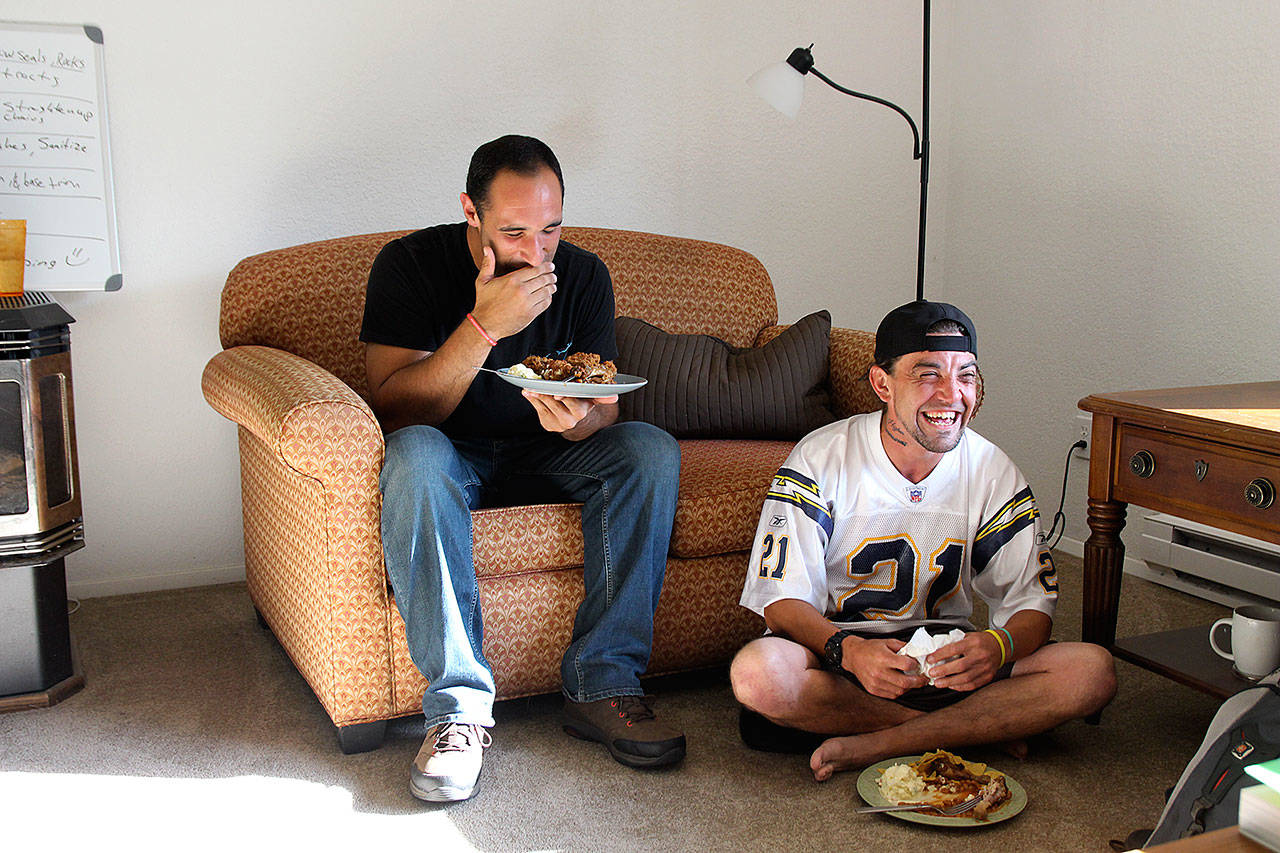Seven formerly homeless men recently sat in the living room of a North Whidbey house and discussed their new beginnings.
Leading the discussion was Jonathan Forbes, who lost his job, car, house and his sense of self-worth. He’d been addicted to heroin since he was 14 years old, had two prison sentences and went into the Island County Jail for stealing a credit card out of a car.
Then he decided to make some changes.
Today, the 37-year-old Island County Drug Court graduate is a mentor for men experiencing almost identical circumstances.
He serves as a live-in advisor at the nonprofit Mighty to Save Ministries’ sober house, which opened June 1. Named Jake’s House, it is a seven-bed home for men recovering from addiction and its residents are expected to maintain a program focused on recovery and faith.
Mighty to Save volunteers visited Forbes in Island County jail and “sparked” his relationship with God, which he said has been key to his recovery.
Around the same time, Forbes also entered Island County’s Drug Court program and graduated 18 months later on June 20.
Adult Felony Drug Court offers an alternative to prosecution for non-violent drug-addicted offenders who undergo at least two years of treatment while complying with strict requirements.
One of the goals he set while going through the process was to help open a clean and sober house.
The house’s first resident was Zach Pederson, who is currently also in the drug court program. Pederson and other residents jokingly refer to Forbes as “dad” for his role in keeping the house running and keeping its residents in line.
Jake’s House is Mighty to Save Ministries’ third attempt at a transitional sober house, said founder and President Christina Bowling. Her goal is a to eventually open another house for women.
Bowling, a mother of two children who struggled with addiction, created the nonprofit in 2011. In addition to the transitional house, the faith-based organization offers counseling, budget planning assistance, transportation, weekly support groups and other services.
There’s a rigorous — and somewhat “scary,” according to Pederson — application process to get into the house. There are currently two openings at Jake’s House.
The residents must be actively working or in school and fulfilling their court obligations if they have any. The long application form is meant to demonstrate a commitment to recovery, Bowling said.
“It’s important everybody is on the same page of wanting to move forward,” she said.
In addition to drug tests, a curfew and a no-overnight-guest rule, the residents are also required to attend some kind of church service once a week. It doesn’t matter which one or where, Bowling said.
“Recovery is spiritual, emotional and physical,” Bowling said.
The ministry is based on the idea that faith is a significant part of recovery, she said.
Pederson said he doesn’t consider himself religious and was almost scared away by that aspect of the program. But after he moved in, he was presented with an opportunity at a different sober house and he declined. He’d grown close to the other residents and even the parts that he’d been wary about later turned into positives.
The weekly “devotions,” which are Bible readings and discussions that the men relate to their recovery, and going to church have turned out to be impactful on Pederson’s growth and the rebuilding of his life, he said.
“After being on the streets for three years, I was pretty cold and calloused over,” he said. “(Devotions and church) are things that have helped me feel again.”
Though the backgrounds of the residents differ, there are several similarities. All five men had been homeless. All had run-ins with the law. Many had lost people close to them. All of them are now employed.
The house is meant to foster a familial atmosphere, Bowling said. There’s a chore chart with each of their names. The residents often take turns cooking dinner for each other, even though there’s no requirement to do so.
Pederson and Forbes both referred to it as a house “full of brothers.”
“It’s super helpful and supportive,” Pederson said. “Coming from the streets, there weren’t a lot of people I could trust. There wasn’t anybody I could trust.”
During the weekly meetings, Forbes and the other live-in advisor Jason Armstrong ask the residents how work is going, what’s going on in their lives and provide gentle reminders about things like doing dishes right away and not eating other people’s food.
At the most recent meeting, the men discussed where they were before entering the program. Some had been living out of their cars. Several of them had hopped around different homeless encampments. Chad Woods said he’d been homeless on and off since he was about 13.
Pederson described how he would ride his bike all night during the coldest parts of winter because he was afraid he’d freeze to death if he slept outside.
“We’re glad all you guys are home,” Forbes told them.
“Probably brought down the crime rate in Oak Harbor,” Pederson said with a laugh.
“This is a big milestone,” Pederson later said at the conclusion of the interview.
“This is the first time I’ll be in the newspaper for something positive.”
• To learn more, visit MightyToSaveMinistries.org or call or text 360-929-2959.




